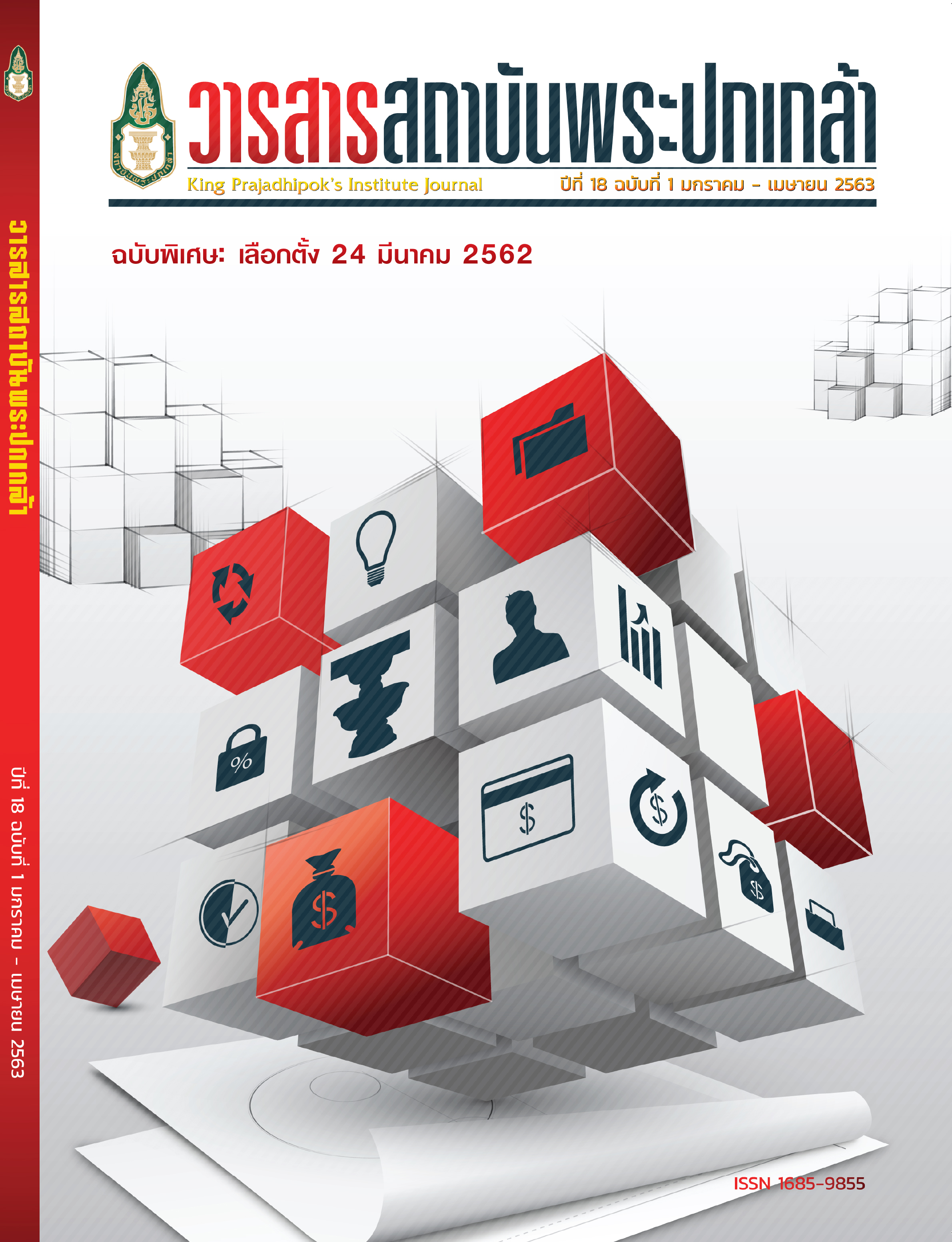Before the Battle Begins: Primary Vote and the 2019 Election
Main Article Content
Abstract
This article aims to analyze the extent to which the Constitution of the Kingdom of Thailand, B.E. 2560 [2017] and the Organic Act on Political Parties, B.E. 2560 [2017] have brought about reform of political parties. To achieve this goal, this article used a conceptual framework derived from the theory of mixed constitution and the methodology of qualitative research. The study revealed that despite some political parties’ efforts to increase space for their members to participate in certain activities,especially those concerning candidate selection, most political parties are still subject to manipulation by the party leader and party executive members. Thus, it cannot be said that the expansion of party members’ participation in parties’ political affairs has been the practical outcome of the Organic Act on Political Parties. Rather, evidence from many
cases revealed that increases in the number of a political party’s members and any broadening of their roles occurred due to an attempt to adapt to electoral competition conditions under the new electoral system mandated in the constitution and political party law. Therefore, this article suggests that political party laws concerning the process of candidate selection within the political party should be practical and written in ways that support members of political parties to participate in all of their parties’ processes and activities meaningfully and voluntarily, instead of the current strict legislation that is too difficult to implement and does not help to increase the power of political party members.
Article Details
@ 2020 King Prajadhipok's Institute The Government Complex Commemorating All Right Reserved.
References
คำสั่งหัวหน้าคณะรักษาความสงบแห่งชาติ ที่ 13/2561 เรื่อง การดำเนินการตามกฎหมายประกอบรัฐธรรมนูญว่าด้วยพรรคการเมือง (เพิ่มเติม). (2561, 14 กันยายน). ราชกิจจานุเบกษา. เล่ม 135 ตอนพิเศษ 225 ง. น. 24-29.
เจือ ราชสีห์ หลุดโผผู้สมัคร ส.ส. จุดเริ่มต้นสะสางครั้งใหญ่ใน ปชป. (2561, 24 ธ.ค.). สปริงนิวส์. สืบค้นจาก https://www.springnews.co.th/column/407383
ณัชชาภัทร อมรกุล, อรรถสิทธิ์ พานแก้ว และฐิติกร สังข์แก้ว. (2562). ความหวังและความน่าจะเป็น: ฉากทัศน์พรรคการเมืองไทยภายใต้รัฐธรรมนูญ พ.ศ. 2560. กรุงเทพฯ: สถาบันพระปกเกล้า.
ทีมบรรณาธิการ เดอะบางกอกอินไซด์. (2561, 10 พฤศจิกายน). อภิสิทธิ์’ชนะเลือกตั้งหัวหน้าพรรคประชาธิปัตย์. เดอะบางกอกอินไซด์. สืบค้นจาก https://www.thebangkokinsight.com/62430/
ไทยรัฐออนไลน์. (2558, 2 พฤศจิกายน). มีชัย แจงข้อดีสูตรเลือกตั้ง 21 อรหันต์ พาเกิดปรองดอง. ไทยรัฐออนไลน์. สืบค้นจาก https://www.thairath.co.th/content/536557
ผู้จัดการออนไลน์. (2561, 5 ตุลาคม). ปชป.เคาะประกาศการหยั่งเสียงเบื้องต้นเลือกตั้ง หน.5 พ.ย.พร้อมประกาศผลทันที?. ผู้จัดการออนไลน์. สืบค้นจาก https://mgronline.com/politics/detail/9610000099821
พรรคอนาคตใหม่. (2561). เอกสารอธิบายการคัดเลือกผู้สมัคร ส.ส. คณะกรรมการสาขา และคณะทำงานจังหวัด. สืบค้นจาก https://futureforwardparty.org/wp-content/uploads/2018/10/การคัดเลือกผู้สมัคร-สส-1.pdffbclid=IwAR1e5la0hSIWCBzJ6nQvxP_i4TwjwliBHWFYnlE1c0F6jgGCrPdVjnPXmeE
พระราชบัญญัติประกอบรัฐธรรมนูญว่าด้วยพรรคการเมือง พ.ศ. 2560. (2560, 7 ตุลาคม). ราชกิจจานุเบกษา. เล่ม 134 ตอน 105 ก. น. 1-41.
รัฐธรรมนูญแห่งราชอาณาจักรไทย พุทธศักราช 2560. (2560, 6 เมษายน). ราชกิจจานุเบกษา. เล่ม 134 ตอน 40 ก. น. 1-90.
เวิร์คพ้อยท์ นิวส์. (2561, 14 ธันวาคม). อนาคตใหม่ แจงเคยอธิบายวิธีคัดเลือกคนลง ส.ส.ไว้ตอนสมัครแล้ว. เวิร์คพ้อยท์ นิวส์. สืบค้นจาก https://workpointnews.com/2018/12/14/อนาคตใหม่-แจงเคยอธิบายว/
สติธร ธนานิธิโชติ และธนพันธ์ ไล่ประกอบทรัพย์. (2561). ไพรมารีโหวต : ความรู้ฉบับปูพื้นฐาน. กรุงเทพฯ: สถาบันพระปกเกล้า.
ส้มขม ชิงเก้าอี้ไพรมารีเดือด!. (2561, 15 ธันวาคม). ไทยโพสต์. สืบค้นจาก https://www.thaipost.net/main/detail/24256
หทัยกาญจน์ ตรีสุวรรณ. (2561, 25 กันยายน). ประชาธิปัตย์: ชิงหัวหน้าพรรค หรือประวัติศาสตร์จะซ้ำรอย. บีบีซีไทย. สืบค้นจาก https://www.bbc.com/thai/thailand-45636649
อรวรรณ ธีรพัฒนไพโรจน์. (2561, 11 ธันวาคม). สัมภาษณ์พิเศษ: ปิยบุตร แสงกนกกุล จัดทัพ‘อนค.’สู้เลือกตั้ง 62. มติชนออนไลน์. สืบค้นจาก https://www.matichon.co.th/politics/news_1266725
Blythe, James M. (1992). Ideal Government and the Mixed Constitution in the Middle Ages. New Jersey: Princeton University Press.
Borz, Gabriela & Janda, Kenneth. (2020). Contemporary Trends in Party Organization: Revisiting Intra-party Democracy. Party Politics, 26(1), 3-8.
Brancati, Dawn. (2008). Winning Alone: The Electoral Fate of Independent Candidates Worldwide. Journal of Politics, 70(3), 648–62.
Carty, K.R. (2004). Parties as Franchise Systems: A Stratarchical Organizational Imperative. Party Politics, 10(1), 5–24.
Carty, K.R. (2013). Are Political Parties Meant to be Democratic?. In Cross W & Katz R (Eds), The Challenges of Intra-Party Democracy (pp. 11–26). Oxford: Oxford University Press.
Chambers, Paul & Croissant, Aurel. (2010). Monopolizing, Mutualizing, or Muddling Through: Factions and Party Management in Contemporary Thailand. Journal of Current Southeast Asian Affairs, 29(3), 3-33.
Cross, William, Kenig, Ofer, Pruysers, Scott & Rahat, Gideon. (2016). The Promise and Challenge of Party Primary Elections: A Comparative Perspective. Montreal: McGill-Queen’s University Press.
Gallagher, Michael. (1988). Introduction. In Michael Gallagher & Michael March (Eds), Candidate Selection in Comparative Perspective: The Secret Garden of Politics (pp. 1–19). London: SAGE.
Hazan, Reuven Y., & Rahat, Gideon. (2010). Democracies within Parties: Candidate Selection Methods and Their Political Consequence. Oxford: Oxford University Press.
Hicken, Allen. (2009). Building Party Systems in Developing Democracies. New York: Cambridge University Press.
Ignazi, P. (2017). Party and Democracy: The Uneven Road to Party Legitimacy. Oxford: Oxford University Press.
Janda, Kenneth. (2005). Political Parties and Democracy in Theoretical and Practical Perspectives: Adopting Party Law. Washington, DC: The National Democratic Institute for International Affairs: NDI.
Keil, Silke & Gabriel, Oscar. (2012). The Baden-W?rttemberg State Election of 2011: A Political Landslide. German Politics, 21(2), 239-246.
Kestilä-Kekkonen, Elina & Söderlund, Peter. (2014). Party, Leader or Candidate? Dissecting the Right-wing Populist Vote in Finland. European Political Science Review, 6(4), 641-662.
Lundell, Krister. (2004). Determinants of Candidate Selection: Degree of Centralization in Comparative Perspective. Party Politics, 10(1), 25-47.
Sundberg, Jan. (1997). Compulsory Party Democracy: Finland as a Deviant Case in Scandinavia. Party Politics, 3(1), 97-117.
Trefs, Matthias. (2003). Voter Confusion in German Federal Elections: The Baden-W?rttemberg Electoral System as a Possible Alternative. German Politics, 12(3), 82-106.
Ufen, Andreas. (2008). Political Party and Party System Institutionalization in Southeast Asia: Lessons for Democratic Consolidation in Indonesia, the Philippines and Thailand. The Pacific Review, 21(3), 327-350.
Villodres, Carmen Ortega. (2003). Intra-party Competition under Preferential List Systems: The Case of Finland. Representation, 40(1), 55-66.


